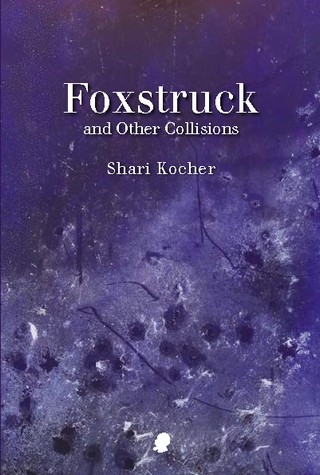 Foxstruck and Other Collisions by Shari Kocher
Foxstruck and Other Collisions by Shari Kocher
Puncher & Wattman, 2020
When I first read this book, I was taken aback by all the foxes, deer, and horses. These types of animals seemed cringy, stereotypical, Disney. Why isn’t she talking about kangaroos or koalas? I thought. Native animals have more weight, more depth, more inflections. After reading it again, I realised it was me being cringe, pretending as if colonisation didn’t happen, as if I wasn’t white—a little princess—as if I wasn’t really a person and I didn’t really exist.
If there’s one thing Kocher does in this book it’s affirm existence, precisely by tarrying with the violence that is one of its conditions. Kocher starts the titular poem ‘Foxstruck,’ standing in the paddock, looking at the “Dog Star,” Syrius—the brightest star (19). This Syrius has “the almost / forgotten name of a flagship,” the HMS Syrius of the first fleet (19). This ship brings with it “typhoid, cholera, and sweetened damper,” the latter a euphemism for the poisoned bread settlers distributed to First Nations people in an act of genocide, as Kocher writes in the notes (135). The speaker has inherited this history: “Makes no sense how we got here” (19). She is bereft of place and cosmology, her only history that of genocidal settlers. Yet she is here, and therefore it necessarily:
[…] Makes perfect sense: a fox, eye-locked, almost touching me. Three red paws on the ground, one white, lifted in mid-step, a thousand tiny hairs sparking moonlight. (19)
Seeing the fox helps the speaker make sense of her existence, but this making sense isn’t final, there’s not really an answer:
[…] Standing alone in a paddock pouring electricity under a night sky blinking cold atoms without answer, blood quickens the slow burn of fox, tricky as history, the fire before and after. (19–20)
Fire is a central theme of the book. In ‘Foxstruck’ the speaker is struck by the fox, because it holds the “old language of fire” (19). In ‘Goats Cheese with Honey and Rosemary on Toast on a Sunday Morning,’ fire is also old, originary: “Fire having made us, heat becomes us” (41). Kocher draws the link between origin and the present moment. Fire made us in an originary, alchemical way, along with the other elements, and heat, in touch and food, continues to sustain us. The poem continues:
Hands that milked the goat and bee, the bee that milked the flower, equally your hands, last night and this morning churn, to set, to rise, to spread this yeast in me the fire alights (41)
The prosaic object of the title—‘Goats Cheese with Honey and Rosemary on Toast’—loses its shine of objectivity as Kocher identifies the primary element—fire—as well as the relation—love—that made the meal possible. Fire and love are metaphors for each other in this poem, and both seem indispensable.









